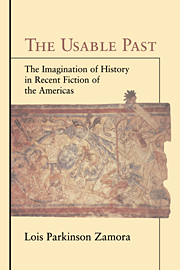Book contents
- Frontmatter
- Contents
- Preface
- Acknowledgments
- PART I ANXIETY OF ORIGINS
- 1 The Usable Past: History as Idea in the Americas
- 2 For the Record: Novels, Newspapers, Narration
- 3 Ancestral Presences: Magical Romance / Magical Realism
- PART II INTERTEXTUALITY AND TRADITION
- Comparative Conclusions: Baroque New Worlds
- Notes
- Index
2 - For the Record: Novels, Newspapers, Narration
Published online by Cambridge University Press: 01 September 2009
- Frontmatter
- Contents
- Preface
- Acknowledgments
- PART I ANXIETY OF ORIGINS
- 1 The Usable Past: History as Idea in the Americas
- 2 For the Record: Novels, Newspapers, Narration
- 3 Ancestral Presences: Magical Romance / Magical Realism
- PART II INTERTEXTUALITY AND TRADITION
- Comparative Conclusions: Baroque New Worlds
- Notes
- Index
Summary
Even if all the reports that have come down to us concerning the past, up to our own time, were true and were known by some person, it would be less than nothing in comparison to what is unknown. …
Michel de Montaigne, “On Vehicles”La imposibilidad de penetrar el esquema divino del universo no puede, sin embargo, disuadirnos de planear esquemas humanos, aunque nos conste que éstos son provisorios.
Jorge Luis Borges, “El idioma analítico de John Wilkins”But the impossibility of penetrating the divine scheme of the universe cannot dissuade us from outlining human schemes, even though we are aware that they are provisional.
Jorge Luis Borges, “The Analytic Language of John Wilkins”IREFERRED IN MY INTRODUCTION to Georg Lukács' observation concerning the parallel development in the eighteenth century of the novel and the modern conception of history. Hegelian historicism found its appropriate literary form (or, rather, produced it) in the realistic novel. The Borgesian “modest history” that concluded the previous chapter and the magical realist ghosts that will appear in the next one are mitigating circumstances – disruptions of linear, causal, Hegelian (“realistic”) narrative structures. In this chapter, I consider a number of realistic novels as well as other “provisional” schemes, to use Borges′ term cited in my epigraph, that purport to record history: newspapers and photojournalism.
- Type
- Chapter
- Information
- The Usable PastThe Imagination of History in Recent Fiction of the Americas, pp. 40 - 75Publisher: Cambridge University PressPrint publication year: 1997



